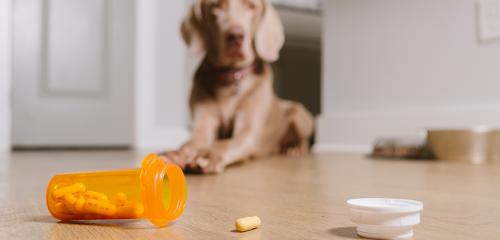The Role of supplements in Your Pet's Health

As pet parents, we love our fur babies and want to give them the best life possible. We feed them healthy food, take them on walks, and provide them with toys and treats. But did you know that many pet supplements, like vitamins and probiotics, can boost their health and longevity? In this blog, we'll explore the benefits of pet vitamins and probiotics and share tips on choosing the best supplements for your pet!
Pet supplements are becoming increasingly popular as pet owners strive to ensure their furry friends get the vitamins, minerals, and nutrients they need to stay healthy. Joint pet supplements include omega-3 fatty acids, glucosamine, probiotics, hemp oil, and vitamin E. Omega-3 fatty acids help to keep your pet's coat and skin healthy, glucosamine helps with joint health, and probiotics support gut health. Hemp oil can help with anxiety and sleep, and vitamin E helps support cardiovascular health and the immune system. In addition to helping your pet stay healthy, pet supplements can also help improve your pet's mood and behaviour. With the proper dosage, pet supplements can be a great way to keep your pet feeling its best.
Multivitamins
Multivitamins for pets are an excellent way to meet your pet's nutritional needs. They are specially formulated to provide all the vitamins, minerals, and nutrients a pet needs to stay happy and healthy. Multivitamins for pets are typically easy to feed and can provide your pet with an easy way to supplement their daily diet. Additionally, they can help reduce the occurrence of health problems, as well as make your pet's coat shine. With the variety of supplement options, you can easily find one that fits your pet's lifestyle and dietary needs.
Joint supplements
Joint supplements are a great way to help pets stay healthy and active as they age. They can relieve joint pain, help improve mobility and reduce inflammation. Joint supplements often contain ingredients such as glucosamine, chondroitin, MSM, and hyaluronic acid, which can help keep joints healthy and strong. They are usually easy to administer and can be added to food or given as a treat. It's essential to consult your vet before giving your pet any supplement to ensure it's the right one for them.
Fatty acids
Fatty acids are:
An important part of a pet's diet.
Providing essential nutrients and helping with joint health.
Coat shines.
Skin condition improves.
Omega-3 fatty acids benefit pets because they help reduce inflammation, improve immune system health, and potentially even help prevent certain diseases. Many pet foods contain some form of fatty acid, but you can also give your pet a supplement containing this vital nutrient to ensure they receive adequate amounts. Additionally, consider adding rich acid-rich foods to your pet's diet, such as eggs, fish, and flaxseed.
Importance of giving nutritional supplements to your pets
Providing the right supplements to your beloved pet cannot be overstated. Not only do they help to keep them healthy and happy, but they also provide essential nutrients that their regular diet may not offer. By providing your pet with the right supplements, you can help protect them against deficiencies and help to keep their coat, skin and nails healthy, their muscles strong, and their bones strong. Additionally, pet supplements can help support joint, heart and digestive health and prevent certain diseases and conditions. Pet supplements are a great way to ensure your pet gets the nutrition they need to live a long, happy, healthy life.
Final thought-Things we should take care of while giving supplements to your pets
Proper nutrition is vital for our pet's health, which means regularly providing supplements. However, it's essential to be safe when giving supplements to our pets. We should always consult a veterinarian to find the best accessory for our pet's needs, as not all supplements are equal. Additionally, we should always measure and administer the correct dosage to our pet according to the directions on the supplement bottle and never give our pet-human vitamins or minerals unless specifically instructed by a vet. Finally, we should never give expired or damaged supplements to our pets, as they may cause serious harm. Taking these precautions while dosing our pets with supplements can ensure their safety and well-being.
Post Your Ad Here
Comments